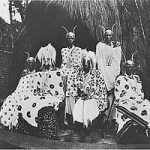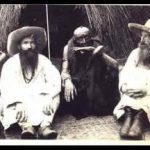IX. Lineage Affairs: Marriage, Inheritance, Neighborhoods And Ancestor Worship
MARRIAGE AND DIVORCE
A young man normally waits for his father or his “fathers” to find him a wife. Marriage is more a matter of concern for the lineage than for the individual. Within the stronger lineages, it may be a matter of strategy to place a son or daughter in the proper families, forming alliances that might strengthen the lineage in its struggle against the encroachments of the central authority.
On the other hand, using the same technique, the chieftain, as head of the nuclear feudal cluster, may marry the sons of his clients into what he considers the strategic families from his point of view. Infiltration being a favorite technique, it is highly probable that he would marry the most faithful Hutu followers into the lineages winch compete with the nuclear feudal cluster. However, in the case of the Tutsi, the broader aspect of a ruling class has to be considered, and, when a marriage is effected among Tutsi, alliances are sought farther away. In the case of the chieftain himself and his immediate family, these are sought in Central Ruanda.
Marriage is, therefore, a very important institution as regards the lineage. A certain amount of freedom is left the young people, but they seem to be generally of the mind that one should marry properly in the fashion that would profit the lineage.
In initiating a proposal of marriage, the father of the boy approaches the father of the girl with a calabash of beer. After the subject has been broached, the father of the girl will either say that she is promised elsewhere — which is a way of refusing — or he does not give his answer right away — which means that he sees the proposed union in a favorable light. Calabashes of beerare brought as betrothal gifts by the boy’s father. During these visits the terms and bride-price are agreed upon. The bride-price may be given then, but it is more likely that a time is then set for it to be given. This occurs usually after the birth of the first child. The bride-price may be hoes, lengths of cloth, or a cow (never several cows, even among the Tutsi). The last is becoming more frequent.
If a young man and woman wish to be married, and for some reason the lineage has not yet made or will not make the formal arrangements, they elope. The young man, by the time he has reached a marriageable age, has already built himself a house. He therefore elopes by taking the girl in with him. If the union is suitable to the lineage, the normal acts associated with betrothal and bride price are eventually carried out by the father of the boy. If the union is not acceptable, the couple is eventually separated and the resulting children, if any, belong to the girl’s lineage. However, divorce can occur even if a bride price has been paid, in which case the father’s lineage has rights over the children. These early marriages and divorces seem to be frequent.
Divorce is easy. A woman may leave the house of her husband and go back to the house of her fathers and brothers. This household always remains “home” to her. It is her privilege to use this threat of leaving in order to come to terms with her husband. If she finally does leave, she takes care to tell a neighbor that she is indeed leaving for good. She sometimes has a neighbor come into the house to witness the fact that she is taking nothing with her that properly belongs to her husband. Or, with different intent, she might deliberately take something of her husband’s, such as money, which gives her even better bargaining power, if he were to ask her to return. She remains with her father or brother until her husband comes — or does not come — to fetch her. If he comes, he bas to bring a calabash of beer.
If a man wishes to repudiate a wife, he asks her to visit her father. He gives her a calabash of beer to take with her. This is customary for such a visit, but he also gives her a set of new clothes. This latter gift is the sign for her not to return unless he fetches her back.
Older men who lose their wives, either through death or divorce, seem to have no trouble in finding a woman in the same circumstances but usually younger than themselves. The two “marry”, without ceremony, and they are considered as husband and wife by all. Most men and women go through several marriages in their lifetime. The rate of divorce seems to be much higher among the Hutu than among the Tutsi.
To a query about the reasons for divorce, the answer most often given is “for personal reasons”. However, judging by other answers, incompatibility of character and infertility of one or the other parties seem to be the dominant reasons. There is of least one interesting case in which the behavior of a wife towards her husband’s mother is considered to have been improper. Because this occurred in a Hutu marriage the case might have been tried by the lineage council, but, in fact, it was tried by the council of the nuclear feudal cluster to which the woman’s husband belonged. This council — against the husband’s wish — dissolved the marriage.
The exchange of goods at marriage begins with the minimum of one calabash of beer given as a betrothal gift by the boy’s father. The lower the status of a Tutsi donor, the more calabashes he presents. The chieftain, for instance, gave only one. Among the Hutu peasants, however, this rule of status does not apply and the number of beers is probably controlled by the accessibility of beer.
A lineage may not demand payment of the bride price before the birth of the bride’s first child. Often it is given only several years alter the first child has come.
The bride joins her husband at marriage. She does not have to bring any gifts with her to her husband’s home, but it is the habit to do so, particularly in more recent times. Older men’s first wives often had brought nothing at all. The articles which the bride might bring are called ibirongoranywa. They consist usually of additional clothing, butter pots, baskets, and toilet articles.
Something is given by the groom to his father’s sister, who has been active in the wedding ceremony. The gift may be a sheep, a piece of cloth, 100 francs, or even a token 1-franc piece. The groom also gives a token gift to the brother who “gives the bride away”, so to speak.
Finally, sometime after the bride price has been given, the bride’s lineage gives the indongoranyoto the groom. The indongoranyo is a return on the bride price; that is, if the bride price has been a cow, the indongoranyo is a female calf from that cow. If the bride price has been five hoes, one or two of these same hoes are returned to the groom.
SUCCESSION AND INHERITANCE
The head of a lineage is also head of his own nuclear family in the same way that his brothers are the heads of their own nuclear families. As time passes and each nuclear family becomes a shallow lineage of three generations, there is always a head for it. Only among the higher class Tutsi does the succession of the head of the lineage take on some seniority in the sense that the headship is passed always within the same line of descent. Ramaging would, then, be possible, but in fact, segmentation is not a feature of these lineages.
Succession and inheritance are kept distinct from one another so that, in theory, an older son might succeed to his father’s status, while a younger son might inherit his wealth. However, it is usual for the two to pass to the same person who is usually, but not necessarily, the eldest son. A man will indicate which of his sons he wishes to have as his successor and heir. The head of a lineage will leave his wooden stool, his lances, and his bow to the son who is to succeed him.Possession of these goods was even used as evidence in court to decide a case in which a man contested the headship of his brother.
When a man inherits his father’s position as lineage head, he becomes, as his father was, responsible for those who are his own abavandimwe. He “inherits” his father’s wives and he, as head of the lineage, has to distribute the responsibility for these women among his abavandimwe. He may marry those that are not his own mother. The children he has with these women are considered as the children of the lineage as are all the children of the abavandimwe.
When his father dies, if he already has been named head of the lineage, which is usually the case, he has to proceed — in council — to distribute the goods of his father. As lineage head, he takes the lion’s share because of his greater responsibilities, e.g., possible care of his own sister or father’s sister. All other brothers share alike regardless of birth order. The brothers of the deceased do not receive any part of the inheritance — they have had their share from their own father. Nor do the deceased’s daughters receive any share; they are provided for by the new lineage head when the need arises. There are exceptions, however. One occurs when a brother of the deceased is so young that he has not received a share of his own dead father’s estate. Then, this young person is treated as one of the sons of his recently deceased brother and is given a share of this inheritance.
The wife or wives of the deceased who do not remarry retain each the house she has been living in, along with its household goods.
One way in which a family head may “increase” (i.e., in prestige if not in material goods) the amount of a son’s inheritance,especially among the Tutsi, is to “give” that son one of the unmarried women of the lineage to whom the son then becomes father. The son may then receive her bride price when she marries. Although this is considered theoretically honorable, it is not, in fact, considered as a material advantage — not only because preparing a girl for marriage costs much, but because the bride price is not considered as wealth.
Wealth to be used by the lineage head to care for the needy of the lineage is called ingarigari.This is kept apart from his own share of the inheritance and his own property, and he may not dispose of it for other purposes. (Cows also may be ingarigari, but they cannot be inkungu)
Succession in the nuclear feudal cluster follows the same pattern as for the family and lineage. In the case of the ordinary nuclear feudal cluster, the headship is passed on from father to son and clients are transferred in the same way as property. In the chieftain’s cluster, the chieftainship is not necessarily passed on from father to son. The greater feudal cluster which regulates these positions also reserves the right to designate the successor of the chieftain. However, whoever he is, he has rights to the chieftain’s share of lands and cows (demesne), distinct from what he might hold as an individual.
The demesne in the past had consisted of lands and properties left by the preceding chieftains. It is important to note that in addition to the demesne herd of cattle, the new chieftain received from each Tutsi of the area a cow in sign of submission. In addition to the land demesne, the chieftain received an ingobyi rugo, that is, a parcel of land upon which he set up his rugo. This had to be given by the Hutu and was obtained from whoever occupied the spot where the chieftain chose to establish himself. These “gifts” of cows and land were called indabukirano.At least the former were forbidden by the administration as early as 1924. It is not clear whether the land demesne was forbidden also, but, in fact, the chieftains seem to have received the land demesne long after 1924, if not the “gifts” of cattle.
The demesne becomes a sort of ingarigari estate upon which the chieftain can draw to help those in need, acting as a sort offather to his nuclear feudal cluster. Yet, as chieftain, he also has access to inkungu properties which he may redistribute to newcomers. In effect, and especially in the case of redistributing banana and coffee plantations, he can and did manifest a preference towards members of his nuclear feudal cluster. The fact, therefore, that he manipulates estates in both systems, so to speak, gives him a tremendous advantage in the play for power. It is an unfair advantage in terms of the “tribal” aspect of his tenure, in that it allows him to break custom with impunity.
https://uk.amateka.net/ix-lineage-affairs-marriage-inheritance-neighborhoods-and-ancestor-worship/https://uk.amateka.net/wp-content/uploads/2021/04/mariage_roi.jpghttps://uk.amateka.net/wp-content/uploads/2021/04/mariage_roi-150x150.jpgModel CitizenshipMARRIAGE AND DIVORCE A young man normally waits for his father or his 'fathers' to find him a wife. Marriage is more a matter of concern for the lineage than for the individual. Within the stronger lineages, it may be a matter of strategy to place a son or daughter...BarataBarata rpierre@ikaze.netAdministratorAMATEKA | HISTORY OF RWANDA




